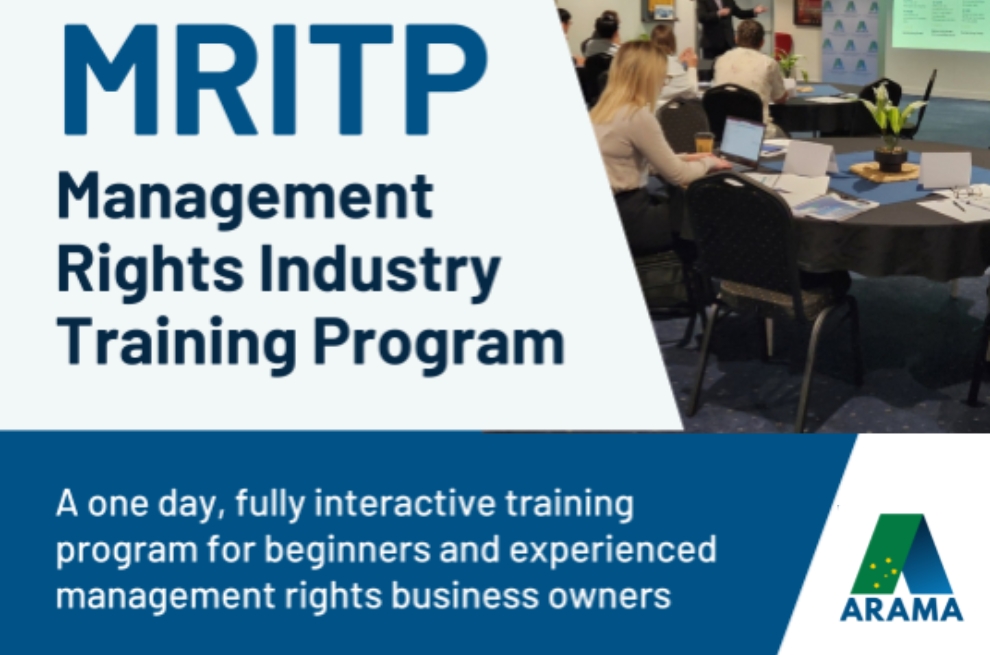About Management Rights -
Published: 06 September 2006.
The following information has been kindly provided by Hillhouse Burrough McKeown Lawyers and is the most comprehensive document on this subject we have seen. They are very experienced in the legals of buying or selling management rights.
What are Management Rights ... and why buy?
Management rights is the business of on site caretaking and letting of units or townhouse complexes.
You might want to buy management rights for a range of reasons:
The lifestyle interests you
It suits you to buy a business and a home in one
The return on investment is above average compared to other owner operator businesses.
But first, what exactly are "management rights"?
When developers build units or townhouse complexes of a reasonable size, it makes sense for the developer to provide for the long term caretaking of the common property (like the gardens and the pool) and for there to be an on site letting service for owners who might want to let their property.
These arrangements are called management rights.
It makes sense for the developer to create management rights because he or she then has an asset to sell, sometimes for quite substantial sums.
It also makes for more harmonious living within the complex if the management rights are well set up. The common property will be looked after and the on site manager should be able to handle tenants and rent collection better than an outside agent.
Because you will be collecting rent for people you will need a special form of real estate agent's licence to own and operate management rights. This is called a restricted letting agent's licence.
Because the licence only permits you to collect rent from within your complex, it is much easier to obtain than a full real estate agent's licence.
A restricted letting agent's licence for management rights is not difficult to obtain. While it does involve completing six modules of the Real Estate Agent's Course, we will be able to provide you with assistance to complete these modules. They may be completed either by correspondence or by attending a course.
Recap
Management rights is on site caretaking and letting of units and townhouses.
Developers create management rights in the first place and sell them to people like you.
You need a restricted letting agent's licence to be a manager.
Learn the Lingo
Like all industries, management rights has its own language.
If you are going to have a look at management rights, then it is better to learn that language sooner rather than later. It's not that hard"
Community Title
The name given to freehold property that is subdivided into separate titles or lots (eg units or townhouses) and common property.
Lots
This is the individual title of the owner; their unit or townhouse.
Common Property
All the property in a development that is shared by all the owners, eg foyers, hallways, swimming pools, gardens, tennis courts.
By Laws
These are the rules of the body corporate. They relate to the use of the lots and common property. They define what the body corporate can and can't do. The by laws apply to everyone entering the complex: owners, tenants and guests alike.
Body Corporate
The body corporate is a separate legal entity created to control the common property. All the owners are members of the body corporate.
A body corporate is like a company. It has an elected board of directors called the Committee. It has a company secretary/treasurer called the body corporate manager. It holds an Annual General Meeting.
Special meetings are called Extraordinary General Meetings. The people who attend these meetings are the owners who are like the shareholders of the company.
The Act
This means the Body Corporate & Community Management Act 1997, which is the legislation in Queensland that covers units and townhouses. NSW, VIC and NZ have Different Acts in place.
Modules
The modules are groups of regulations which give detail to the Act. Each module is a different set of rules, designed for a specific type of body corporate. Types of modules include the Standard, Accommodation, Commercial and Small Schemes modules.
Manager
Obviously the name given to the person with the management rights. But they are also called RAMs (resident accommodation managers) or RUMs (resident unit managers) or on site managers. The 1997 Act uses the terms "service contractor" and "letting agent".
Caretaking ... to do or not to do?
Caretaking is about looking after the common property.
The caretaking functions are set out in some detail in most agreements.
The most important thing about caretaking is to know whether the agreement requires you to actually do the caretaking work or to supervise others doing the work. People talk about "do agreements" and "supervisory agreements".
Where the duty must be performed by the Manager, you must do the work personally or pay staff yourself.
If the agreement is supervisory, then work is actually done by employees or contractors paid by the body corporate. You or your people must supervise this work.
Generally with supervisory agreements even though the body corporate pays the workers, you have the right to hire and fire. It's hard to be an effective supervisor if you don't have that right.
You will receive a salary from the body corporate for caretaking. Usually this is paid each month. Depending on circumstances you may pay your own tax or it may be deducted from the salary.
Tips
In addition to what the agreement says, find out exactly what the current caretaker is doing and make sure you do it just as well if not better.
Make sure your caretaking salary goes up each year. The salary should at least be linked to the consumer price index (CPI) to keep pace with inflation.
Check who pays for the material and equipment necessary to do the caretaking work. Is it you or is it the body corporate?
Keep a log book of what you do so at any time you can justify your caretaking salary. Remember, absentee owners do not see all the work you do and resident owners can take it for granted
Letting
Your letting agreement with the body corporate authorises you to conduct a letting business within the complex in which you live. You need the agreement to get your restricted letting agent's licence.
The letting agreement will usually require you to do the following:
Use your best endeavours to promote the complex well
Supervise the standard and conduct of the tenants you find for your owners
Maintain an office and reception area.
Letting is a non compulsory service. Of course, owners do not have to let their units. They can live in them themselves or lock them up. If they do let, then they don't have to use your letting service. They are free to use any service they like.
It is the exception, however, that someone would choose to use an off site letting service rather than someone on the spot focused only on letting in a particular complex, or a complex in which both you and the letting owners have a vested interest.
For letting, the user pays. In other words, the body corporate does not pay you anything to provide the letting service. You are paid by the owners who choose to use your service.
By law, you must have a separate agreement with each owner using your service setting out the charges for collecting the rent and looking after the owners' units. This agreement is called an "Appointment to Act as a Letting Agent". The REIQ has a standard form which has proven to be fair and reasonable to both parties.
You also have an opportunity to earn extra income from tenants or guests by providing extra services like:
Cleaning
Repairs and maintenance
Hire of equipment, and
In the case of tourism related properties, the sale of tours and theme park tickets. You can earn a commission on these sales.
The standard REIQ property management forms for permanent residential complexes and appointment to act as letting agent forms for holiday letting complexes are in plain English and are available in pad form from the REIQ bookshop.
What will I get when I buy management rights?
You are buying the rights contained in contracts with the body corporate. These contracts differ from building to building. Sometimes all the rights are in one contract. In other cases, caretaking and letting are dealt with separately.
When you purchase management rights, you take a transfer or an assignment of the rights under those agreements. You will buy either from the developer or from an outgoing manager.
Usually you will also buy:
The manager's unit
The right to occupy an office/reception area if there is not one contained within the freehold title of the manager's unit, and
The plant and equipment necessary to run the letting office and do the caretaking work.
NSW management rights
Management rights exist in NSW and are becoming more common, particularly in the northern beaches from Tweed Heads down and the newer strata titled property developments in Sydney.
In many ways the NSW industry mirrors the Queensland industry. However, the history of the industry is not as long and, consequently, the statutory framework is not as well developed. Instead of obtaining a restricted letting agent's licence, a resident unit manager must obtain an on site residential property manager licence.
The educational requirements are similar to those in Queensland.
New Zealand management rights
Management rights are currently possible in New Zealand but there is little legislation governing their existence.
Recent reports indicate New Zealand management rights are being structured like those in Queensland in anticipation the legislative framework which governs management rights in Queensland will soon be adopted.
The major piece of legislation enabling management rights in New Zealand is the Real Estate Agents Act 1976. Under this legislation, everyone who acts as a real estate agent is required to obtain a real estate agent's licence, including letting agents for strata titled property such as resident unit managers.
Generally these licensing requirements impose heavy educational and experience guidelines, which are difficult to satisfy except by long serving real estate industry professionals.
However, current New Zealand legislation offers those who want to run management rights the opportunity to have the experience and educational guidelines relaxed as the body charged with licensing real estate agents in New Zealand can issue a permit to an applicant enabling them to carry on the specific business of running letting in one particular strata property.
This avoids the need for a full licence and makes management rights more accessible to prospective purchasers.
Where do I start?
The rules of buying management rights are fairly simple. There are just three.
Rule 1
Work out what you are worth. Why? Because this will determine how much you can borrow and what you can afford to buy.
When you are working out what you are worth concentrate on liquidating assets (converting your assets to cash).
How much will you get when you sell your home, pay off the mortgage and meet the costs of sale?
How much superannuation do you have available?
It's what's in the bank that counts when it comes to borrowing for management tights.
The amount of cash you have to invest in management rights determines exactly what you can afford to buy because the banks have very clear guidelines about how much they will advance.
As a general rule the banks will lend you 50% of the price of the management rights and the unit against the security of the management rights and the unit alone.
For example, if you sell all your assets and pay off all your debts and have $300,000 in cash, then the bank will lend you another $300,000 to buy management rights and a unit worth $600,000 in total.
The only way to get more money from the hank is to pledge extra property as security for a higher level of borrowing.
Rule 2
Look for what you can afford
Once you know how much you can afford to spend, look at the real estate advertisements to see what and where you can afford to buy. You're wasting time looking at management rights you cannot afford because you won't get the money from the bank to settle.
The specialist management rights agents (and there are only a handful) generally advertise in the major and local newspapers on Wednesday and Saturday in the "Businesses For Sale" classifieds. The ad will give you a brief description of what's available, how much management rights make, what the unit is worth and the asking price for the total package.
"First work out what you are worth. This will determine how much you can borrow and what you can afford to buy."
Rule 3
Have some idea of the type of management rights you want
There are different types of management rights that will appeal to different types of people.
It is helpful when looking at management rights to at least know what's available and the advantages and disadvantages of each type of management rights.
In the next few pages we will go on a tour of the different options available to you.
You'll learn about:
holiday letting businesses
residential or permanent letting
brand new management rights, and
established management rights.
TIP
Remember that when you buy management rights, there are expenses, known in the industry as "ingoings".
These include:
Bank fees
Solicitor's fees
Accountant's fees
Government stamp duty
Insurance
Work out exactly what these expenses are and don't leave yourself short.
"There are no hard and fast rules in relation to the valuation of management rights: like everything else, demand establishes the true value."
Holiday letting
Tourism is Australia's great growth industry and management rights plays an enormous role in the development of tourism in Australia, particularly in Queensland where management rights began.
Historically, management rights has played an important role in tourism areas where holiday units are popular and where they predate hotels and motels.
On the Gold Coast, for example, the first international hotel was only built in 1984. It was The Ramada, and it was designed to be converted to apartments if the hotel didn't work.
Long before The Ramada there were many units built under the management rights system with domestic and international tourists serviced by management rights operators. The trend continues today.
If you buy a management rights business which is predominately holiday letting, then you are, in a sense, running a resort. You will need to market your building to attract holiday makers, usually for short stays (one weekend to a couple of weeks). You will be providing a higher level of service, but the returns should be greater.
In a holiday letting complex, most of the owners are likely to be investors, so they'll be looking for a good return from their units.
Advantages of holiday letting
The return on investment is higher than other forms of management lights. Managers make money on rent collection but also on service charges like cleaning and linen hire. The greater the turnover the greater the income from these sources.
The holiday letting business involves understanding how to market tourism properly. Some do this better than others.
If you understand the secrets of successfully marketing your property, then you have an ideal opportunity to grow the capital value of your business.
The location of your holiday letting business will probably be superb. Great for lifestyle.
But remember good returns don't come from sitting around the pool.
Disadvantages of holiday letting
To pain no gain. Holiday letting is hard work.
You need good management skills so that you run the business rather than it running you.
Holiday letting can be more complex than other types of management rights particularly in the area of marketing. You need good support services to learn this part of the business.
You can be at the mercy of the tourism industry. A pilot strike/bad weather and general economic factors can affect your business.
"Holiday letting is the glamorous part of the management rights industry. Or is it? The rewards are great but the workload is heavy."
Permanent / Residential letting
The principles for managing a residential complex are the same as for holiday letting:
Find the tenant
Collect the rent
Look after the property
Nurture your relationship with your unit owners, and
Grow your business.
The main difference is you will have more owner occupiers living on site and your tenants will be for longer terms (six months or more).
You will need to pay particular attention to the groundskeeping. Remember, many of the people who pay you (the owners, collectively called the body corporate) will be inspecting your work every day.
Advantages of permanent letting
The income stream is steadier. You are not subject to the peaks and troughs of holiday letting.
The "front desk" requirements are not as great as with holiday letting.
You are not as involved in the "hard sell" of tourism and its related products.
Disadvantages of permanent letting
Your rate of return is slightly lower than holiday letting but so is the risk and it is still better than average compared with other businesses.
It is easier for off site letting agents to compete with you if you take your eye off the ball. The local real estate agents' office down the road doesn't have much hope of running a successful short term holiday letting business, but they do have expertise in placing a permanent tenant and managing rental properties. The way to deal with this is to keep your units full and your owners happy.
If you are not careful, then you might get caught up in the politics of the complex. You need to stay out of this. There is no mileage in offending some or all of your clients.
"It is true that management rights started in tourism areas. But it didn't take long for it to spread to residential developments. That includes high rise unit developments and townhouses or condominium type developments."
Buying Brand New (off the plan)
"Buying brand new means buying off the developer's plan before the complex is finished. Sometimes it means buying before the complex has even been started. Here are some tips."
Know your builder. Inspect other completed developments. Talk to the managers of these complexes about the builder's product.
Have your contract checked to see if it includes looking after things like paths, driveways, fences, cupboards. These "extras" could cost a lot of money.
Developers may fail to make adequate provision for storage for managers, so remember to ask about storage. Don't assume your needs will be understood by the developer.
If you want to change anything in the contract, then get in early. If unit sales have already been made before you buy the management rights, then the developer may not agree to the changes because it might jeopardise the sales.
Developers have to make full disclosure of the terms on which they are selling units and these terms include the terms of the management rights. If you want to change any of these terms, then the developer might be required by law to give all the previous purchasers an opportunity to withdraw from the contract if they feel they are being materially prejudiced by the changes.
Developers are, of course, very reluctant to do this.
Beware of agents overselling unit owners for expected returns. You might be the only one left to pick up the pieces of shattered expectations.
Ask what the selling agents are saying to purchasers and look at the material they are giving to purchasers and form your own opinion as to whether or not you will be able to live up to the expectations that have been set by the agents.
Buying an Established Business
Many people like the relative certainty that comes from buying an established business: what you see is what you get.
This goes for both the business and the building.
Existing buildings have gone through the "teething problems" that people talk about with new buildings. All the building defects have been attended to.
Of course, the building might be at that point where it needs some money spent on it. You will be the one who will need to convince owners to put their hands in their pockets.
This is not always easy. As an experienced body corporate manager always says, "it is very dangerous to get caught between a unit owner and a bucket of money". Communication and education about the benefits of refurbishment are the keys to encouraging unit owners to spend money.
There is another advantage to buying management rights in existing buildings. Many owners of new units and brand new complexes have very high expectations of the financial performance of their investment units. Sometimes these expectations are too high. They might still have the stardust in their eyes sprinkled by the selling agents. As time passes these
expectations become more realistic.
Existing businesses are capable of easy verification of income and expenses. It's all there to see. You do not have to rely on projections and guess work.
Tips
Ask these questions
When were the units last refurbished?
Is there any sign of concrete cancer?
Are there problems with water leaking?
How much money has the body corporate saved in its sinking fund for future maintenance like painting?
Has a sinking fund analysis been carried out?
Is there any history of dispute within the body corporate?
"when you buy an established business... what you see is what you get"
Dealing with agents
In all probability you will buy your management rights through a real estate agent. Probably one that specialises in management rights, and there aren't many of these.
Real estate agents must hold a licence and their business is regulated in Queensland for your protection.
The better agents are also members of the Real Estate Institute of Queensland (REIQ) which enjoys a good reputation and has a code of ethics which members must follow.
Look for the REIQ endorsement it's a sign you are dealing with an agent who has chosen to belong to the main industry body.
Remember, an agent's job is to get the best possible price for the management rights. The commission payable to the agent will usually be a percentage of the sale price. The higher the price paid, the higher the commission to the agent.
Although agents have a responsibility to be fair to both the buyer and the seller, agents act for the seller, not the buyer. The seller pays the agent's commission.
Smart questions to ask your agent
"Know the smart questions to ask the agent so you can compare what's available and find what's right for you."
What is the net profit of the business?
Management rights sell as a multiple of the net profit. For example, if the net profit is $100,000.00, then the management rights might be valued at say, four times that $400,000.00 plus the value of the manager's unit and equipment. Finding out the net profit is important
Net profit should be calculated on the basis of income less expenses. Do not include in the expenses the owners' "wages", bank interest or income tax. Make sure the income does not include illegal payments like "kick backs" or secret commissions from suppliers that are engaged by the manager to work for the owners.
How many owners are in the letting pool?
The letting pool is the name given to the group of owners who use the letting service. The name is misleading as it implies that income is pooled and paid to people equally. This is not the case. Management rights work on an individual accounting basis. Every owner receives the income for his or her unit less the expenses for that unit. Still, a group of owners who let are called the pool.
You need to know how many are in the pool. You should also ask about the others. Are they live in owners, lock ups or are they with outside letting agents? You can learn a lot about a business by asking these questions.
The number of outside letting agents will be your key to how well the building is being run at the moment. More than a couple of outside letting appointments would be abnormal. This might be your chance to improve the business by winning those owners from the outside agents.
How long do the agreements have left to run?
Management rights have a definite beginning and a definite end. Usually they are set up for five years with a five year option to the manager. At the end of this time there is no requirement on the body corporate to renew the agreements. It is up to you to negotiate a renewal with the body corporate at the appropriate time. Obviously having a reasonable period of certainty is important.
How much is the body corporate salary?
We have already discussed the caretaking function and the salary payable from the body corporate. When inspecting management rights you should be aware of the amount of the body corporate salary. Does it increase each year? Does it take account of GST? Is it adjusted to "market" at the beginning of each option period? What does the manager have to do for the salary? These are the questions to ask.
Is the office on title or common property?
You will recall that your unit is on a title which you own and the common property is shared with other owners and controlled by the body corporate. Some management rights are created with the office/reception area for the business on your title. Others have an office/reception area on the common property.
If the office is on the common property, then you need to establish your right to use the
office. You should have "exclusive use" of the area under one of the body corporate by laws or under an occupation authority from the body corporate.
Ownership of the office/reception area or having control of it under exclusive use can be important to renewing agreements with the body corporate at the end of your management rights.
What you need from your banker
Consider the following example:
Purchase price of manager's unit $250,000.00
Purchase price of management rights $350,000.00
Stamp duty and legals (estimated) $25,000.00
TOTAL $625,000.00
Net income $100,000.00
The bank will lend you $312,500.00. You will need the other $312,500.00 in cash to settle.
The major banks that lend for management rights will usually lend 50 per cent of the purchase price, legals and stamp duty.
The bank will want the loan structured so the principal debt reduces each year of the management rights agreement. At the end of the management rights agreement the debt should be no greater than the value of the unit. This is the bank's protection against your failure to get a renewal of the management rights agreement from the body corporate.
In our example assume a 10 year management and letting agreement. The debt must be reduced from $310,000.00 to $250,000.00 minimum over 10 years - a yearly capital reduction of $6,000.00 per annum plus interest.
It is important to deal with banks that know management rights. They will be able to say at the outset what they can and cannot do. Banks that don't know management rights can inadvertently mislead you. Your application may be rejected by a higher authority in the bank at the eleventh hour or they may impose terms and conditions that are unacceptable. This can cost you dearly.
You will not have these problems from the banks that regularly lend for management rights.
Checklist of information required by the bank to assess your application
Resume - show complete work history for all applicants.
A copy of both contracts of sale (the contract for the unit and the management rights business).
A copy of the management and letting agreements.
A copy of your latest taxation returns - personal and business.
If applicable, financial records for any companies or trusts you operate.
Verification report by a bank approved accountant familiar with the management rights industry on the previous twelve months' figures for the management rights being purchased
Your projected monthly cash flow for twelve months covering all income and expenditure (including your financing costs).
A signed statement of assets and liabilities.
A signed credit check form to allow completion of the necessary credit checks.
What you need from your accountant
A ccountants play an important role both in the purchase of management rights and ongoing support to you once you have bought your business.
Verification pays
One of the benefits of buying management rights is there is a formal verification of net profit by an accountant prior to completing your purchase.
This is your opportunity to have an independent expert look at the books and records of the business and verify that the net profit represented to you is, in fact, true.
This process can be carried out with relative accuracy because management rights is a business that works on a trust account. The income and expenses are able to be traced by those who know what they are looking for.
The verification report will be done early in the conveyancing process and provided to your bank to assist with your application for finance. It is important, therefore, that the verification be done by an accountant who will be acceptable to your bank.
Once the purchase of management rights has been completed the accountant has an ongoing role that includes:
Auditing your trust account in accordance with the requirements of the Property Agents and Motor Dealers Act
Preparation of your trading statements and income tax returns for your business
Assisting you with setting up books and records for the trust account and general account
Attending to registration with the Taxation Office for group tax where you have employees, and
Assistance with workers compensation, superannuation and other statutory registration.
What your lawyer does for you
The 10 steps to owning management rights
Your solicitor's job is to help you get what you bargained for... a good business and a home.
It's important to remember you are buying a business first and a home second. The laws about management rights are complex and not everyone understands how these businesses work. At Hillhouse Burrough McKeown we have made this one of our particular areas of expertise. This is the 10 step process that will guide you through and show you how we help protect your interests.
Step 1 - Structuring your purchase
We advise you on the most tax effective way to buy your management rights. A telephone call before you purchase may save you paying unnecessary tax.
Step 2 - Going to contract
How to sign a contract without delay while still protecting your interests. We give you some specific clauses to include in the contract to cover the most common mistakes made by management rights purchasers.
Step 3 - Obtaining finance
How to apply for finance and ensure your banker has all the information they need for a quick assessment.
Step 4 - Getting your licence
We outline our proven method of applying for a restricted letting agent's licence, and getting it. We also provide assistance with the educational requirements.
Step 5 - Verifying the profit
This is your protection against misrepresentation. You will want an experienced accountant to verify the books and records of the business to confirm the income stream. We will refer you to a specialist accountant if you don't have one.
Step 6 - Due diligence
This is one of the most important things we do for you. We closely examine the management rights and by laws to make sure there are no technical legal problems. If there are, then we tell you how to fix these before you part with settlement money.
Here, we "lift the lid" on your management rights and give you a full report on your agreements.
Step 7 - Body corporate approval
The body corporate must consent to the transfer of the management rights. There are formal steps to be taken to ensure this approval is obtained. We liaise with all parties to obtain this consent.
Step 8 - Buying your unit
We handle the conveyance of your unit from searches to settlement.
Step 9 - Settlement planning
Save time and effort by getting organised before settlement. We help you have everything in place.
Step 10 - Settlement
You'll be on site learning about your business so we will make all the arrangements necessary for settlement. We attend to adjusting settlement figures, and make sure your money is in place and all the correct documents are available for the settlement meeting, which we attend on your behalf.
How to find out more about management rights
Here are five ways you can find out more about management rights from the experts:
1. Attend the REIQ training course for managers. This is the most comprehensive training course available on management rights. It is conducted in different venues throughout Queensland six times a year. It covers essential information on marketing, computers, insurance, employment law, the law of management rights, legal aspects of the letting system, practical input from managers in the industry today and a whole lot of other information.
2. TAFE colleges on the Gold Coast and Sunshine Coast run courses on management rights which are ideal for people who have just entered the industry or are contemplating buying management rights.
3. Read "Managed Right", the newsletter on management rights which Hillhouse Burrough McKeown provides.
4. Pick up the telephone and ring one of our specialist management rights solicitors on 07 3220 1144. The team is always available for an initial telephone consultation or personal visit.
5. Attend local onsite managers social nights and talk to others already in the industy. These can be viewed on the Events & associations page within this site.
1. Attend some local managers social nights and talk to others already in the industry. You can view these places by viewing the Events and Associations page within this site.










































